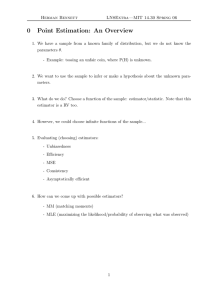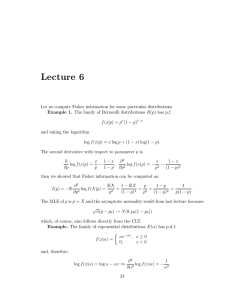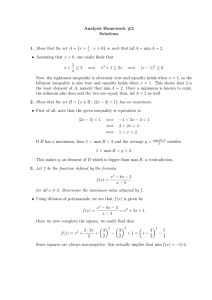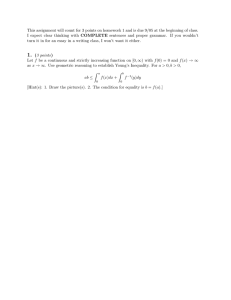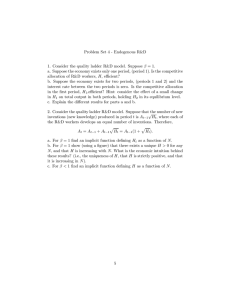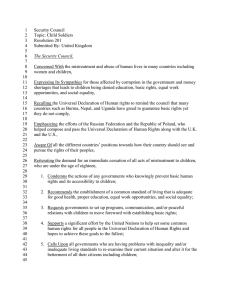Document 13587329
advertisement
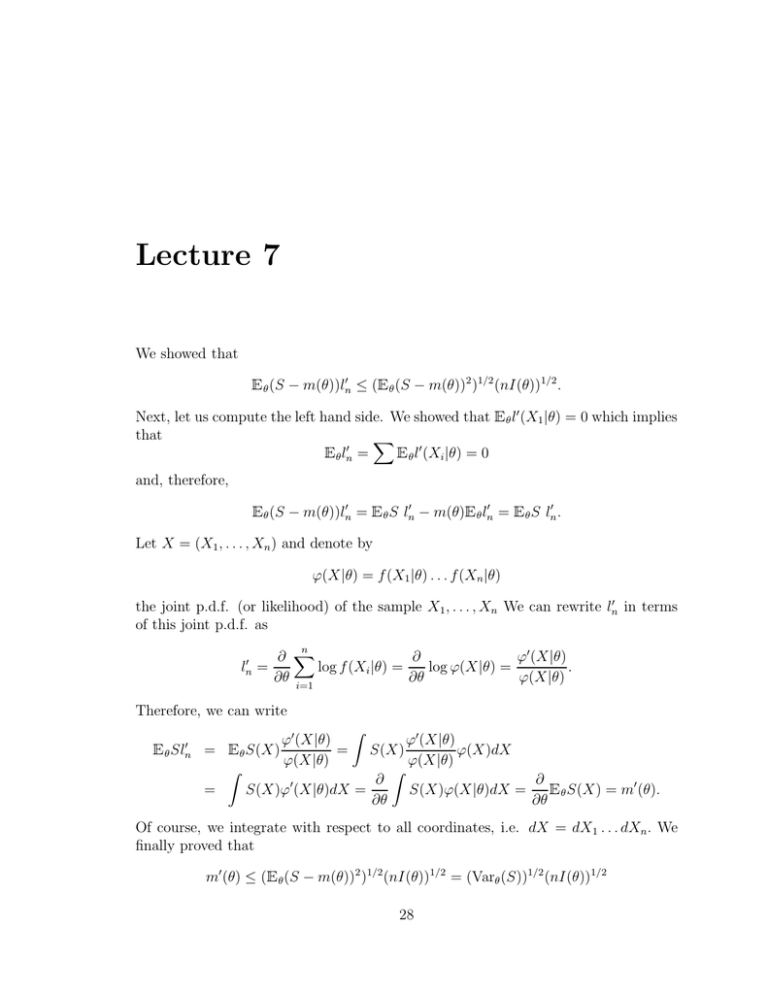
Lecture 7 We showed that ν (S � − m(χ))ln∈ ∀ ( � ν (S − m(χ))2 )1/2 (nI(χ))1/2 . Next, let us compute the left hand side. We showed that that ∈ ∈ ν ln = ν l (Xi |χ) = 0 � νl � ∈ (X1 |χ) = 0 which implies � and, therefore, � ν (S − m(χ))ln∈ = � νS ln∈ − m(χ) � ∈ ν ln = � νS ln∈ . Let X = (X1 , . . . , Xn ) and denote by �(X |χ) = f (X1 |χ) . . . f (Xn |χ) the joint p.d.f. (or likelihood) of the sample X1 , . . . , Xn We can rewrite ln∈ in terms of this joint p.d.f. as ln∈ = n � � �∈ (X |χ) log �(X |χ) = . log f (Xi |χ) = �χ i=1 �χ �(X|χ) Therefore, we can write � ∈ ν Sln �∈ (X|χ) = ν S(X) �(X |χ) � �∈ (X |χ) S(X) �(X)dX �(X | χ) � � � � ∈ = S(X)� (X|χ)dX = S(X)�(X |χ)dX = �χ �χ = � � ν S(X) = m∈ (χ). Of course, we integrate with respect to all coordinates, i.e. dX = dX1 . . . dXn . We finally proved that m∈ (χ) ∀ ( � ν (S − m(χ))2 )1/2 (nI(χ))1/2 = (Varν (S))1/2 (nI(χ))1/2 28 29 LECTURE 7. which implies Rao-Crámer inequality. Varν (S) → (m∈ (χ))2 . nI(χ) The inequality will become equality only if there is equality in the Cauchy in­ equality applied to random variables S − m(χ) and ln∈ . But this can happen only if there exists t = t(χ) such that S − m(χ) = 7.1 t(χ)ln∈ = t(χ) n i=1 l∈ (Xi |χ). Efficient estimators. Definition: Consider statistic S = S(X1 , . . . , Xn ) and let m(χ) = � ν S(X1 , . . . , Xn ). We say that S is an efficient estimate of m(χ) if � 2 ν (S − m(χ)) = (m∈ (χ))2 , nI(χ) i.e. equality holds in Rao-Crámer’s inequality. In other words, efficient estimate S is the best possible unbiased estimate of m(χ) in a sense that it achieves the smallest possible value for the average squared deviation 2 ν (S − m(χ)) for all χ. amer’s inequality only if We also showed that equality can be achieved in Rao-Cr´ � S = t(χ) n i=1 l∈ (Xi |χ) + m(χ) for some function t(χ). The statistic S = S(X1 , · · · , Xn ) must a function of the sample only and it can not depend on χ. This means that efficient estimates do not always exist and they exist only if we can represent the derivative of log-likelihood ln∈ as ln∈ = n i=1 l∈ (Xi |χ) = S − m(χ) , t(χ) where S does not depend on χ. In this case, S is an efficient estimate of m(χ). 30 LECTURE 7. Exponential-type families of distributions. Let us consider the special case of so called exponential-type families of distributions that have p.d.f. or p.f. f (x|χ) that can be represented as: f (x|χ) = a(χ)b(x)ec(ν)d(x) . In this case we have, � � log f (x|χ) = (log a(χ) + log b(x) + c(χ)d(x)) �χ �χ a∈ (χ) ∈ = + c (χ)d(x). a(χ) l∈ (x|χ) = This implies that n i=1 and If we take n a∈ (χ) + c∈ (χ) d(Xi ) l (Xi |χ) = n a(χ) i=1 ∈ n n 1 1 ∈ a∈ (χ) d(Xi ) = ∈ l (Xi |χ) − . n i=1 nc (χ) i=1 a(χ)c∈ (χ) n 1 S= d(Xi ) and m(χ) = n i=1 =− νS � a∈ (χ) a(χ)c∈ (χ) then S will be an efficient estimate of m(χ). Example. Consider a family of Poisson distributions �(∂) with p.f. f (x|∂) = ∂x −� e for x = 0, 1, . . . x! This can be expressed as exponential-type distribution if we write � � 1 ∂x −� −� e = �⎛�� e exp log ∂ �⎛�� x . � ⎛� � x! x! a(�) �⎛�� d(x) c(�) b(x) As a result, n n 1 1 ¯ S= d(Xi ) = Xi = X n i=1 n i=1 is efficient estimate of its expectation m(∂) = � S = its expectation directly using the formula above: � � � � X1 = ∂. We can also compute −(−e−� ) a∈ (∂) = −� 1 = ∂. �S = − a(∂)c∈ (∂) e (�) 31 LECTURE 7. Maximum likelihood estimators. Another interesting consequence of RaoCrámer’s theorem is the following. Suppose that the MLE χ̂ is unbiased: � χ̂ = χ. If we take S = χ̂ and m(χ) = χ then Rao-Crámer’s inequality implies that Var(χ̂) → 1 . nI(χ) On the other hand when we showed asymptotic normality of the MLE we proved the following convergence in distribution: � ∞ 1 � . n(χ̂ − χ) ≈ N 0, I(χ) In particular, the variance of distribution 1/I(χ), i.e. ∞ n(χ̂ − χ) converges to the variance of the normal ∞ Var( n(χ̂ − χ)) = nVar(χ̂) ≈ 1 I(χ) which means that Rao-Crámer’s inequality becomes equality in the limit. This prop­ erty is called the asymptotic efficiency and we showed that unbiased MLE is asymp­ totically efficient. In other words, for large sample size n it is almost best possible.
